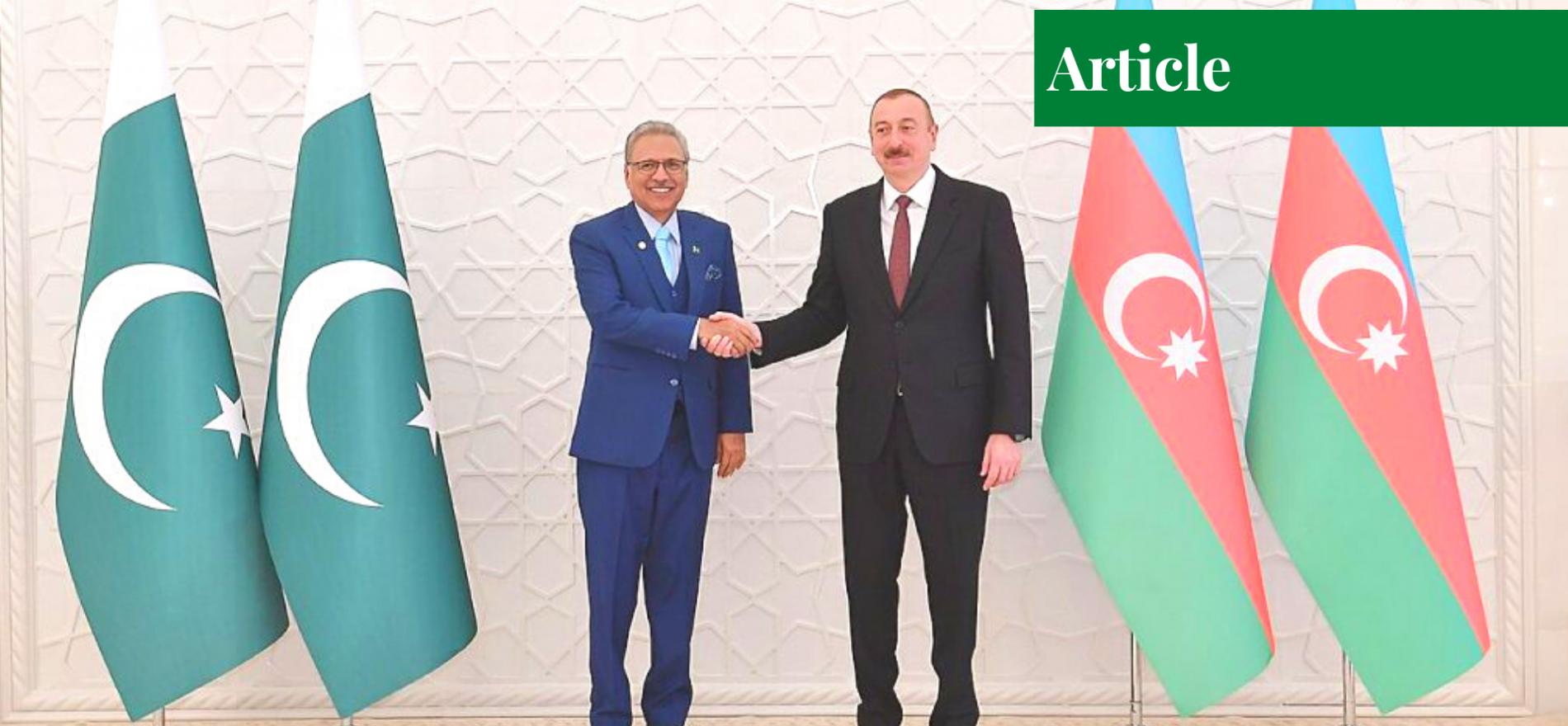Sumaira Waseem received her LL.B. from Bahria University. She is the Regional Coordinator for the Khyber Region at South Asia Students For Liberty. She's previously worked with the Research Society of International Law (RSIL), Pakistan's Ministry of Foreign Affairs, and the Special Technology Zones Authority (STZA).
Diplomatic Relations Between Pakistan & Azerbaijan
Pakistan-Azerbaijan relations have had a significant strategic relationship, owing to Pakistan being the second country to recognize the independence of Azerbaijan in 1991. Diplomatic relations were established on 9th June, 1992, with the Pakistan Embassy being opened on 12th March, 1993 in Baku, and Azerbaijan establishing its Mission in Islamabad on 24th August, 1997.
Pakistan was one of the first nations to undertake a high-level official visit to Baku, and since then, a multitude of official exchanges have taken place between the two states, underpinning their partnership. Former President Sardar Farooq Ahmad Leghari visited Baku in October 1995, followed by the visit of former President Heydar Aliyev to Pakistan in April 1996; former President General Pervez Musharraf visited Baku in July 2004, followed by President Ilham Aliyev’s return visit to Islamabad in April 2005.
In May 2006, former Prime Minister Shaukat Aziz visited Baku to attend the 9th session of the Economic Cooperation Organization (ECO), and then in October 2012, former President Asif Ali Zardari attended the 12th ECO summit in Baku. Former President Mamnoon Hussain’s visit to Azerbaijan in March 2015, effectuated the signing of the Joint Declaration on Strategic Partnership between the two states that ushered in multiple joint ventures in various respects.
Mutual Support: Kashmir and Nagorno-Karabakh
Azerbaijan’s Ambassador, Ali Fikrat Oglu Alizada, extended President Ilham Aliyev’s invitation to President Dr. Arif Alvi, in a meeting in June 2019, and the subsequent visit to Baku reinforced the strategic relationship between the two nation-states, as can be established from President Dr. Alvi’s interview to the Azerbaijani media during his visit, wherein he closely appreciated the support of Baku with respect to Kashmir and upheld his country’s firm position of not acknowledging Armenia, as a representation of its solidarity with Azerbaijan.
Pakistan’s President has also declared his intention to readily offer military support to Azerbaijan. Pakistan has fervently supported Azerbaijan’s perspective on the Nagorno-Karabakh conflict, even initiating a fact-finding mission to the aforesaid region in 2006. Similarly, Azerbaijan has displayed zealous and consistent support for the Kashmir conflict since becoming a member of the Contact Group on Kashmir in 2012.
As a member of the OIC Contact Group on Nagorno-Karabakh, Pakistan has supported Azerbaijan’s stance on the conflict—an integral part of Azerbaijan’s national territory. A recent example is that of the speech of the Foreign Minister of Pakistan, Shah Mahmood Qureshi, at the OIC Contact Group meeting in September 2019, directing pressure to be put on Armenia concerning the Nagorno-Karabakh region.
Amplified Military Cooperation
With growing development and cooperation, the prospect of greater military cooperation is to be expected. Despite its strategic alliances with other partners, Azerbaijan’s inclination towards military cooperation with Pakistan has only intensified. A nuclear state in conjunction with its expansive military assets, Pakistan has much to offer, more so when it comes to Azerbaijan, its longstanding ally.
In May of 2003, a defence agreement between the two countries was concluded, which established annual joint military drills, particularly for special force units; the agreement has since then been zealously honoured, as can be gauged from the participation of Azerbaijani naval personnel in AMAN-2013, a Pakistani-led military exercise in the Arabian Sea, in March of 2013.
The military and defence cooperation has been augmented by, inter alia, several joint exercises, colloquiums, engagement in official meetings, and military agreements. One prime example is that of the military cooperation agreement signed in February 2014 in Islamabad; the iterations of the document during the Working Group Meetings in 2015 and 2016 supplanted the outdated document.
In October 2018, a delegation of Pakistani Armed Forces led by Brigadier General Reyhan visited Azerbaijan to discuss bilateral military cooperation, with particular emphasis on the areas of public relations and moral-psychological training for both armies. This ceaseless military cooperation between the two strategic allies stems from a protocol on bilateral military cooperation signed on March 31st, 2015, which subsequently led to the resultant signing of the “Book of Honour” in November 2017.
Azerbaijan seems to be interested in purchasing the JF-17 Thunder, a multi-functional aircraft. The purchase itself would prove to be beneficial to Pakistan, as it would reduce the per-unit cost of the JF-17. However, the interest, as of now, remains hollow, since no formal deal has been concluded. Nevertheless, upon invitation, the Pakistani Ministry of Defence demonstrated the said aircraft at the 2016 Azerbaijan International Defence Exhibition (ADEX-2016).
Many high-state officials have shown unflinching interest in the JF-17: Yavar Jamalov, Minister of Defence Industry, manifested his interest during the ADEX-2016; Yaqub Eyyubov, Azerbaijan’s First Deputy Prime Minister attended the International Defence Exhibition and Seminar (IDEAS), where he expressed his government’s interest in buying new aircraft.
Currently, the Azerbaijan Air Forces mainly operate the MiG-29, Su-25, and MiG-21 aircraft. Even though the Azerbaijani defence industry was established in 2005, it has shown significant development over the past decade. The country manufactures the well-known Istiglal sniper rifle that is used by Pakistan’s Special Forces.
To Azerbaijan, which has been in a protracted conflict with Armenia, the acquisition and proliferation of military equipment are considered a priority of utmost concern. Moreover, it would prove to be economically and strategically beneficial for Pakistan in exporting aircraft, missile systems, tanks, and other military vehicles.
Lucrative Prospects for Trade
This rising political-military cooperation has led to the prospect of economic ties between both countries. There exists a Memorandum of Understanding (MoU) on the establishment of a Joint Business Council between the Pakistan Chamber of Commerce and Industry and the Azerbaijan Chamber of Commerce and Industry. In October 2018, Azerbaijan financially assisted Pakistan with $100 million, to curb increasing energy deficits, and the State Oil Company of Azerbaijan Republic (SOCAR) supplied Azeri oil and oil-based products such as natural gas.
According to the State Customs Committee of Azerbaijan, bilateral trade amounted to $8.34 million in the period between January and September 2018, reflecting an undoubtedly erratic yet growing trend from $7.3 million and $5.2 million in 2016 and 2017 respectively. In 2017, Azerbaijan established a permanent trade mission in its embassy in Islamabad, qualifying Pakistan among the few countries — others being Russia, Turkey, and the U.S. — where this has been done.
The trade turnover between the two countries has enormously increased by 25 percent in 2018. Azerbaijan could also benefit from investing in CPEC, as it is the leading route for trade in Central Asia. There exists great potential for trade if Azerbaijan were to import rice, vegetables and fruits, medical and pharmaceutical products, textiles, and sports goods from Pakistan, and export high-quality cotton, fruits, chemicals, fats, oil, and non-ferrous metals.
Tourism has also steadily increased due to rising cooperation—from 3,800 tourists visiting Baku in 2016 to 17,556 in 2017. In 2018, there had been over 25,000 Pakistani tourists visiting Azerbaijan. Other than the strategic cooperation between the two nations, such an increase could also be attributed to the online accessibility of tourist visas since January 2017.
A Shared Past to Reinforce the Alliance
Multani Caravanserai and the Baku Ateshgah are prime examples of the testified and tangible historic linkages shared by both nations. Azerbaijan-Pakistan relations trace their shared primordial roots with the Turks and hence Turkish culture is given much significance by both states. Both nation-states are Muslim-majority states, with both taking incessant positions against Islamophobia.
Azerbaijan has extended its support to Pakistan in times of natural calamities. Under the patronage of Ms Mehriban Aliyeva, the incumbent Vice-President of Azerbaijan, the Heydar Aliyev Foundation regularly undertakes humanitarian projects in Pakistan. In the past, the Foundation constructed a girls’ school at a cost of 750,000 USD in the city of Muzaffarabad, Azad Kashmir following the 2005 earthquake.
Armenia vs. Azerbaijan: Pakistan’s Stance
The rancorous confrontation between Armenia and Azerbaijan has convulsed the world that is already battling the coronavirus pandemic. The tensions over the disputed territory can be traced back to 1918, and ironically, the same year marked the dawn of the Spanish flu pandemic.
The Islamic Republic of Pakistan promptly issued a statement following the Armenian-Azerbaijani skirmishes in July 2020, reaffirming its sustained position on the Nagorno-Karabakh territory and extending its continued support to the Republic of Azerbaijan.
Even after the resumption of hostilities in September 2020, Pakistan devoutly continues to support Azerbaijan’s position in the conflict. In return for the said support, President Ilham Aliyev expressed his country’s utmost gratitude to Pakistan; he also commented that he did not require external assistance in the conflict.
Even so, India’s media reported that the presence of Pakistani soldiers in Azerbaijan was indicative of their involvement in the fighting between the two warring states. Pakistan, in a MoFA press release on 2nd October, has denied such, regarding the assertions as “speculative and baseless”.
However, Armenia’s Deputy Foreign Minister Avet Adonts believes there to be a possibility of Pakistani fighters fighting alongside Azerbaijan, adducing patterns of Pakistan’s military support to Azerbaijan in previous clashes. Although the reasoning seems credible to a degree, it would be impolitic to disregard Azerbaijan’s formidable military strength that puts Armenia at a decided disadvantage.
If you want to submit your articles and/or research papers, please check the Submissions page.
The views and opinions expressed in this article/paper are the author’s own and do not necessarily reflect the editorial position of Paradigm Shift.



















